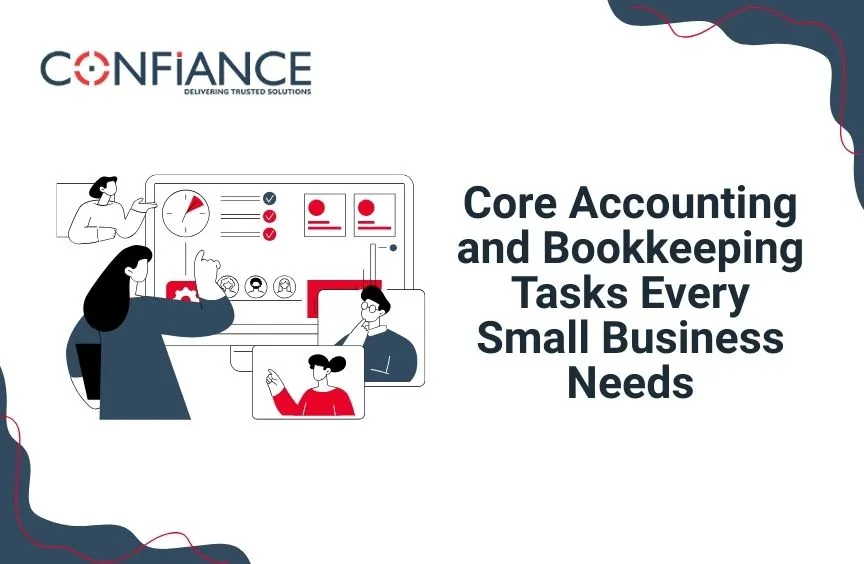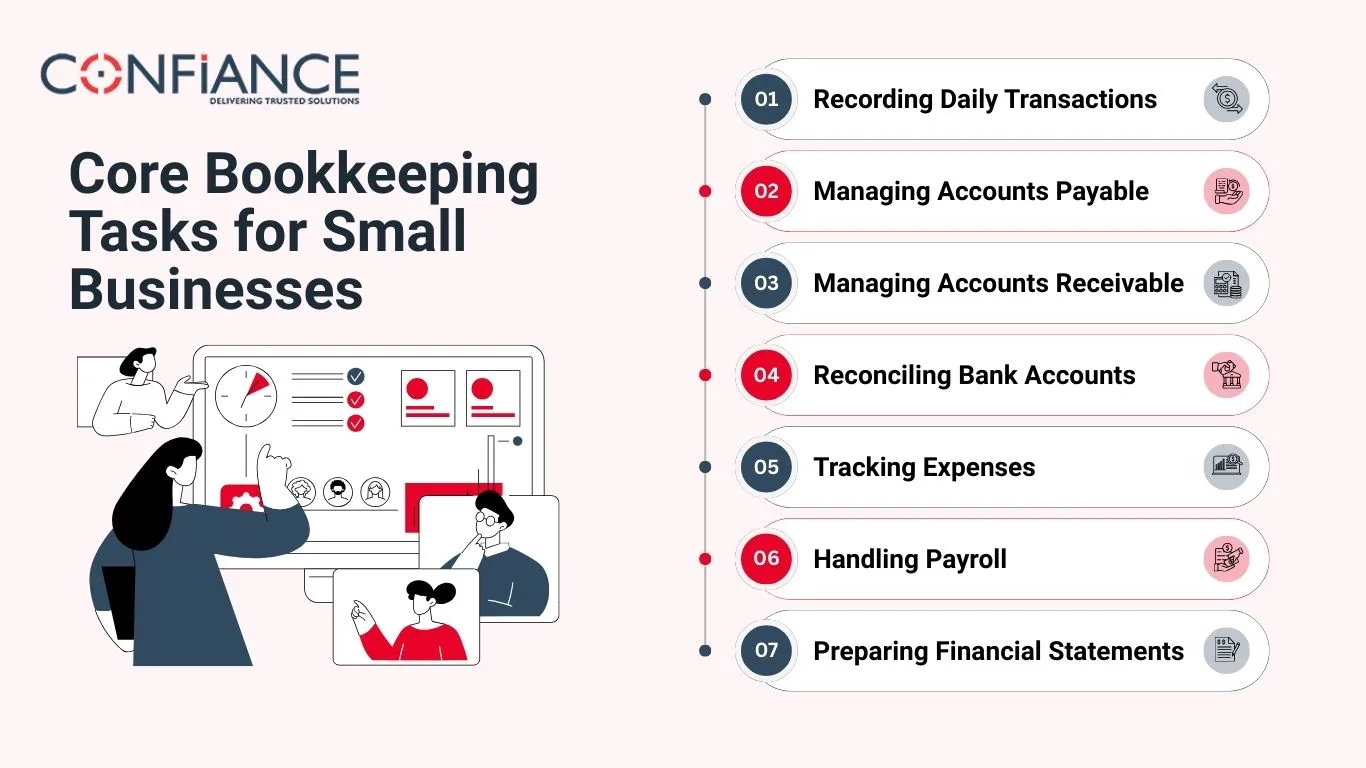
Core Accounting and Bookkeeping Tasks Every Small Business Needs
Running a business means keeping a clear eye on money. Every owner must deal with at least one main bookkeeping task each day or week to stay on track. Without good systems, money leaks out and growth slows down. That is why knowing the right tasks and setting a plan is key to long-term success.
In this guide, we will cover the core accounting and bookkeeping tasks every small business needs, advanced steps to improve accuracy, and how outsourcing can save time, money, and stress.
Why Bookkeeping Matters for Small Businesses
Money tells the story of a business. Numbers show if sales rise, if costs drain profit, or if cash flow stays healthy. For small firms, handling the right records is not only about staying legal but also about staying smart in choices.
The Link Between Money and Growth
When records are neat, owners see what works and what fails. It helps them spot chances to cut costs, plan new offers, and gain trust with banks or partners.
Risks of Ignoring Records
Skipping even one small accounting task can cause fines, cash gaps, or tax trouble. Many small firms fail not because of sales, but because of poor tracking.
Core Bookkeeping Tasks for Small Businesses
Every small business has some daily, weekly, and monthly jobs. These are the bookkeeping tasks that form the base of money health for small businesses.
Recording Daily Transactions
Each sale, expense, or payment should be tracked. This job may seem small, but it keeps accounts clear. Waiting too long to log records leads to missing data and wrong numbers.
Managing Accounts Payable
Bills must be paid on time. Keeping a list of suppliers, due dates, and amounts avoids late fees. It also builds trust with vendors, which is vital for growth.
Managing Accounts Receivable
Chasing unpaid invoices is part of the job. Tracking what clients owe and sending quick reminders is a accounting task that secures steady cash flow.
Reconciling Bank Accounts
Bank statements and records must match. A mismatch may mean errors, missing money, or fraud. Reconciling each month makes sure all numbers line up.

Tracking Expenses
Keeping receipts, noting travel, meals, and other costs makes tax season easier. Good expense records also show where to cut waste.
Handling Payroll
Even with a few staff, payroll is one of the biggest Accounting tasks for small businesses. It includes wages, tax cuts, and benefits. Errors here can lead to unhappy staff and fines.
Preparing Financial Statements
Reports like profit and loss, balance sheet, and cash flow statement guide owners. These show if the business is healthy or needs change.
Advanced Bookkeeping Tasks That Improve Accuracy
Basic jobs keep records running, but advanced tasks make them sharper. These steps take small business bookkeeping to the next level and prevent costly mistakes.
1.Detailed Cash Flow Analysis
Looking beyond profit and loss, cash flow shows if money is truly available. A deep review helps owners plan bills, pay staff, and invest with confidence.
2. Job or Project Costing
For firms that run projects, tracking costs per job is an advanced bookkeeping task. It shows which projects bring profit and which drain funds.
3. Depreciation Tracking
Assets like machines, tools, or vehicles lose value over time. Tracking depreciation keeps reports accurate and helps during tax filing.
4. Accrual vs. Cash Adjustments
Switching between accrual and cash views gives a clearer picture of finances. It helps spot gaps in revenue or costs that cash-based views may hide.
5. Forecasting and Budget Planning
Advanced reports can predict sales trends or costs for the next quarter. This planning helps avoid surprises and improves decision-making.
6. Internal Audits
A periodic internal audit checks if all records are correct. It adds an extra layer of trust and prevents fraud.
Monthly and Quarterly Bookkeeping Task Checklist
Some jobs need less frequent care but are still vital.
Reviewing Budget vs. Actual
Owners should see if they spent more or less than planned. This check helps set better goals for the next cycle.
Adjusting for Tax Deductions
Quarterly tax reviews stop year-end shocks. Tracking what can be claimed saves money.
Checking Inventory
For small businesses, managing inventory is one of the core bookkeeping tasks. It avoids stockouts or overbuying.
Annual Accounting Tasks
Year-end brings the big review.
Closing the Books
This means checking all entries, making sure numbers are correct, and rolling forward into a new year.
Preparing for Taxes
Tax preparation is smoother when all the year’s bookkeeping tasks are done right. Reports must be ready for the accountant.
Planning Ahead
Annual reviews show whether the business can hire, expand, or invest.
Tools That Help With Bookkeeping
No owner needs to do all the work by hand. Tools can cut time and errors.
Cloud Accounting Software
Cloud tools let you log data, send invoices, and check reports in one spot. They save time and reduce paper use.
Mobile Apps
Apps make it easy to track receipts or mileage, which keeps records accurate.
Outsourcing Services
Some firms hire experts to handle each accounting task. This works best for owners who want more time to focus on growth.
Best Practices to Stay Ahead
Good habits make a big difference.
Stay Consistent
Do not delay record-keeping. A set time each day or week avoids stress.
Separate Business and Personal Accounts
Keep business and personal accounts separate to avoid confusion and track finances clearly.
Review Reports Often
Looking at profit, loss, and cash flow often helps spot issues early.
Get Expert Help When Needed
Even if owners do most jobs, advice from a bookkeeper or CPA saves stress.
How Strong Bookkeeping Builds Growth
A well-run system does more than meet rules. It builds the growth path.
Better Cash Flow
Keeping track of income and costs reduces unexpected issues.
Easier Funding
Banks and investors need proof of clean records.
More Free Time
When tasks are clear, owners spend less time on stress and more on sales and growth.
Common Mistakes to Avoid
Even with effort, some owners make mistakes.
Waiting Too Long to Record
Waiting until year-end to track data leads to lost information.
Not Backing Up Data
Digital data must be backed up. Losing records is costly.
Mixing Staff Roles
One person should not handle all the money jobs. It risks fraud.
The Future of Bookkeeping for Small Businesses
The field is changing fast.
Automation
AI tools now track expenses or match invoices. This cuts time.
Real-Time Data
Owners no longer wait for month-end reports. Cloud tools show results live.
Remote Services
Many businesses now hire remote bookkeepers to handle all bookkeeping tasks from a distance.
Why Outsourcing Bookkeeping Tasks for Small Businesses Saves Time and Money
Many owners handle records on their own at first. But as sales grow, so do numbers. At that stage, outsourcing makes sense. Outsourcing bookkeeping tasks can save time and cut costs for small businesses. Here’s why:
Focus on Core Business
When owners pass on the bookkeeping tasks to experts, they free up time to work on sales, service, or product growth. This helps them focus on what they do best.
Cost Savings
Hiring a full-time bookkeeper can be pricey. Outsourcing gives access to skilled help without paying for office space, benefits, or training. It is a cost-friendly way to handle each task.
Access to Skilled Experts
Outsourced teams bring years of knowledge. They know tax rules, reporting needs, and best practices. This reduces errors and keeps records in line with laws.
Better Tools and Tech
Most outsourcing firms use the latest software. Small businesses gain access to advanced tools without paying high license fees.
Scalability
Outsourcing grows with your business. Whether you add more staff, launch new branches, or expand online, an outside team can adjust fast.
Reduced Risk of Errors
With checks in place, outsourced bookkeepers lower the risk of mistakes or fraud. This adds a layer of trust to money management.
Clean books mean clear goals. And clear goals mean long-term success.
Strong records are the base of every small business. Each accounting task may seem small, but together they form a system that keeps money in check. From logging sales to payroll, from monthly reviews to year-end preparation, these jobs guide smart choices.
At Confiance, we understand the daily load that comes with every accounting task. Our team offers full support tailored for small firms. Here’s how we help:
- Dedicated experts who have track records with care and speed.
- Cloud-based systems for real-time updates on your accounts.
- Flexible plans to fit your size and growth stage.
- Compliance checks to ensure you meet tax and law rules.
For small businesses, letting Confinace handle your bookkeeping tasks saves time, reduces stress, and supports growth.
FAQs
- What is the most important bookkeeping task for small firms?
Recording daily transactions is key. Without it, other reports will not show the right numbers.
- How often should I reconcile bank accounts?
At least once a month. This makes sure your books match your bank records.
- Can I do bookkeeping myself?
Yes, but as the business grows, it takes more time. Many owners choose to outsource to save hours and avoid errors.
- What are common mistakes small firms make in bookkeeping?
Mixing personal and business money, delaying record entry, and not backing up data are the most common errors.
- Why should I use software for bookkeeping?
Software reduces manual work, tracks numbers in real time, and stores records safely.
- How does outsourcing save money?
It avoids the cost of a full-time hire, training, and software fees. You only pay for what you need.
- Is outsourcing safe for small businesses?
Yes. Reputable firms use secure systems to protect data, and many provide signed agreements for added trust.
